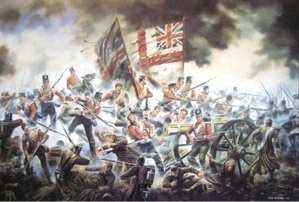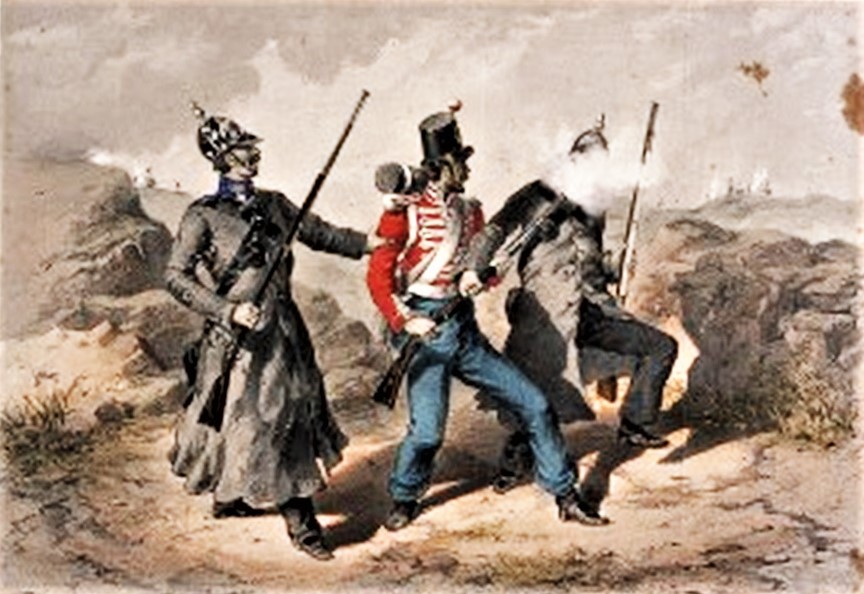Battle of the Alma, 1854

With the defeat of Napoleon in 1815, Europe entered a long period of peace. However, the rise of Russian expansionism gave Britain and France enough common cause to temporarily forget past enmity and combine to go to the aid of Turkey, which had been attacked by Russia in Walachia and the Black Sea. Britain and France declared war on Russia on 28th March, 1854.
The 33rd Foot (Duke of Wellington’s Regiment) left Malta in May, 1854, and was joined at Scutari by the 19th Foot (Green Howards) where they were brigaded into the 1st and 2nd Brigades, respectively, in the Light Division.
The British and French forces concentrated at Varna, expecting to be involved in fighting along the Danube. However, disease broke out, hastening an expedition to the Crimea, with the aim of taking Sevastopol and neutralising the Russian Black Sea Fleet.
On 14th September the Light Division landed at Eupatoria, Kalamata Bay, unopposed, but woefully short of transport, provisions, tentage and medical services. It was not until the 19th September that the Army was ready to advance on Sevastopol.
After marching south for about 20 miles, with little evidence of the enemy, the Allies discovered that Prince Mentchikov had drawn up a large Russian force of infantry interspersed with artillery on the heights overlooking the River Alma, a position he considered to be impregnable.
The Allies ponderously prepared to force the crossing, with the Turks and the French to the seaward. It was not until midday that the British force was ready to cross the river, waist deep in places, to assault the 500 feet high rocky ridge on the south bank.
The British attack was led by the Light Division with the 1st Brigade, the 33rd at its centre, on the right and the 2nd Brigade, including the 19th, on the left. Their objective was the battery of siege guns on the heights overlooking the river, the key to the Russian defences known as the Great Redoubt. After struggling through enclosed vineyards and clambering over stone walls they reached the precipitous banks of the river where they were exposed to plunging fire from the Russian positions as they forded the river and scrambled up the far bank. They then advanced up the hill into the teeth of the Russian guns.
The Russians, still armed with muskets, soon lost their air of invincibility as the British Minié bullets began to rapidly thin their ranks, and the closely packed columns began to melt away as the men at the front found the British could penetrate two or three men with each shot. This allowed the British to force their way up the slope and onto the Redoubt but it was a success achieved at great cost.
The Russian counter attack was not long in coming. The Light Division had been so mauled in the attack that they were briefly forced off the position until the Guards Division and Highland Brigade reinforced the attack to re-establish control of the Redoubt. By 4.00 p.m., after only some three hours of intense fighting, the battle was over and the Russians in full flight.
It was a victory brought about almost entirely by the indomitable courage of the British infantry, which cost them dearly. The British casualties were 2,002 and the casualties within the 19th and 33rd were particularly severe. The 19th lost 220, greater than any other regiment except the 33rd, who lost 239. In no regiment outside the Light Division did the casualties exceed 200. Two days were required to clear the battlefield of the dead and evacuate the wounded.
The Army then went on to lay siege to Sevastopol throughout the winter of 1854/55, suffering severe hardships in the trenches and batteries, but finally broke through the defences in September 1855, bringing the war to an end.
Private Patrick McGuire, of the 33rd, was nominated for the award of a VC, after killing two Russian soldiers who had taken him prisoner. While he was being escorted back to the Russian lines he sprang on his captors, seized his musket, shot one his captors dead and despatched the other with the butt of his rifle. He then returned to his post, to the cheers of his own pickets, with all his own as well as the weapons and accoutrements of his captors. He achieved remarkable acclaim at the time but Queen Victoria personally removed his name from the roll, as she thought his actions were of ‘doubtful morality’ and could lead to prisoners being killed out of hand. He did receive one of the first Distinguished Conduct Medals to be awarded and also received the French Medaille Militaire for his remarkable exploits, which was well covered in the Illustrated London News.
